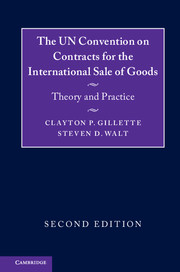Book contents
- Frontmatter
- Contents
- Preface
- 1 The CISG: history, methodology, and construction
- 2 The scope of the CISG
- 3 Contract formation
- 4 Implied terms and interpretation
- 5 Performance
- 6 Liability for nonconformity
- 7 Risk of loss
- 8 Exemption from performance
- 9 Remedies
- Appendix 1 The United Nations Convention on Contracts for the International Sale of Goods
- Appendix 2 CISG status table
- Table of cases
- Subject matter index
6 - Liability for nonconformity
Published online by Cambridge University Press: 05 June 2016
- Frontmatter
- Contents
- Preface
- 1 The CISG: history, methodology, and construction
- 2 The scope of the CISG
- 3 Contract formation
- 4 Implied terms and interpretation
- 5 Performance
- 6 Liability for nonconformity
- 7 Risk of loss
- 8 Exemption from performance
- 9 Remedies
- Appendix 1 The United Nations Convention on Contracts for the International Sale of Goods
- Appendix 2 CISG status table
- Table of cases
- Subject matter index
Summary
INTRODUCTION
Articles 35(1), 35(2), 41, and 42 of the CISG allocate to the seller the risk that goods will fail to conform either to the express requirements of the contract or to certain implied terms. Thus, in everything but name, the Articles describe warranties as to the goods. The language of those Articles will be familiar to the lawyer conversant with the warranties that are called “express warranty,” “implied warranty of merchantability,” or “implied warranty of fitness for a particular purpose,” and “warranty of good title.” One backs into the requirements of Articles 35, 41, and 42 by starting with the statement in Article 36 that the seller is liable in accordance with the contract and the CISG for a nonconformity that exists at the time that the risk passes to the buyer. Articles 35, 41, and 42 effectively indicate what constitutes a lack of conformity by stating certain conditions that the seller must satisfy. Article 35 requires that delivered goods are conforming only if they comply with contractual descriptions, quantities, and qualities required by the contract, only if they are contained or packaged in the manner required by the contract, and only if they meet the implied obligations of Article 35(2). The last of these obligations, by virtue of being incorporated into the contract through the CISG, need not be explicitly set forth by the parties. Instead, they will apply “[e]xcept where the parties have agreed otherwise.” Those implied obligations require conforming goods to be fit for the purposes for which the described goods would ordinarily be used, to be fit for any particular purpose of which the seller was aware if the buyer reasonably relied on the seller, to possess the qualities of any sample or model held out by the seller, and to be contained or packaged in the manner usual for such goods. Article 41 requires that the goods delivered be free of any claim or right of a third party to them. Article 42 imposes similar requirements with respect to conflicting claims and rights that arise from industrial property or intellectual property law.
Article 35 presents a variety of interpretive difficulties. Whether or not goods satisfy the qualitative requirements of the CISG depends on issues such as the meaning of a contractual “description,” the purposes for which the goods ordinarily are used, and any particular purpose of which the seller was aware.
- Type
- Chapter
- Information
- The UN Convention on Contracts for the International Sale of GoodsTheory and Practice, pp. 211 - 268Publisher: Cambridge University PressPrint publication year: 2016



